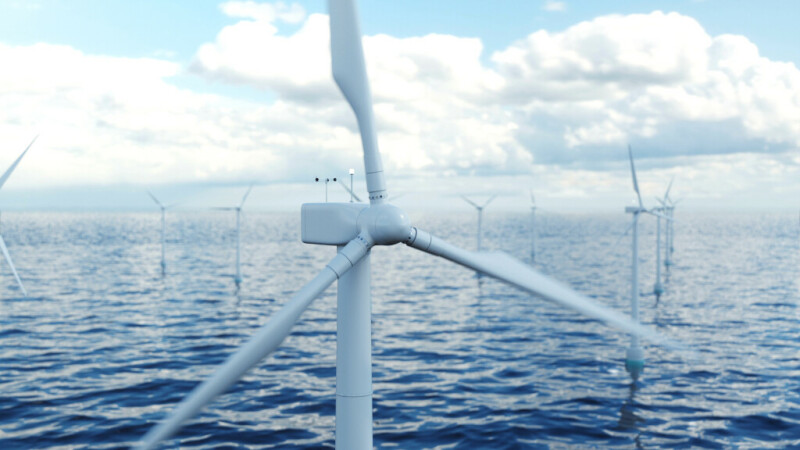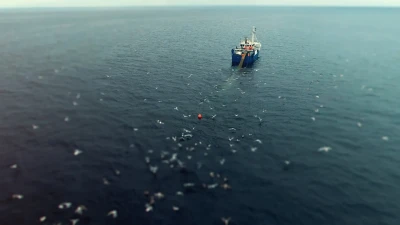Governors of six Northeast states are asking the Biden administration to boost federal tax credits for offshore wind developers, give their states a share of revenue from offshore energy leases and hasten permitting for the projects.
In a Sept. 13 letter, the governors of Massachusetts, Rhode Island, Connecticut, New York, New Jersey and Maryland urgently called for more federal support for their states’ wind power agreements with developers. Echoing statements from Ørsted and other wind companies seeking to revise agreements, the governors wrote that “inflationary pressures, Russia’s invasion of Ukraine, and the lingering supply chain disruptions resulting from the covid-19 pandemic have created extraordinary economic challenges that threaten to reverse these offshore wind gains.”
“Instead of continued price declines, offshore wind faces cost increases in orders of magnitude that threaten States’ ability to make purchasing decisions,” the letter states. “These pressures are affecting not only procurements of new offshore wind but, critically, previously procured projects already in the pipeline.
“Absent intervention, these near-term projects are increasingly at risk of failing. Without federal action, offshore wind deployment in the U.S. is at serious risk of stalling because States’ ratepayers may be unable to absorb these significant new costs alone.”
The letter comes after months of warnings from offshore wind companies that pricing previously negotiated with state energy planners is no longer viable in the face of economic pressures.
In New Jersey, Ørsted’s escalating costs for its Ocean Wind 1 project led state Democratic legislators allied with Gov. Phil Murphy to expand the company’s share of federal renewable energy tax credits, over protests from Republican lawmakers and project critics. That in turn led to calls from the Atlantic Shores project developers for a consistent, industry-wide solution.
The governors’ letter lays out three major steps they want from the federal government:
– “Updated guidance from the Department of the Treasury (Treasury) and the Internal Revenue Service to ensure offshore wind projects are fully eligible for federal clean energy tax credits, including the Domestic Content and Energy Community Bonus Credits to the Investment Tax Credit (ITC) and Production Tax Credit (PTC), under the Inflation Reduction Act of 2022 (IRA). This guidance must ensure that offshore wind projects (including the near- term offshore wind projects) are able to move forward in the current economic climate by providing achievable pathways to qualify for the bonus tax credits and ensuring that the ITC is available for all project components, including the transfer and power conditioning equipment needed to bring offshore wind power to land as well as associated land-based distribution and transmission needed to interconnect these projects.”
– Establish a new revenue sharing program for federal offshore wind leasing. At present, “federal law requires that all revenue generated from offshore wind leases beyond state waters be returned to the U.S. Treasury, leaving ratepayers to bear the brunt of the development costs for these critical projects. The lease revenue is a cost to offshore wind developers, meaning that States’ electricity ratepayers will bear the cost of leases for projects that ultimately interconnect into States’ electric grids.”
– Speed up permitting for projects by the Bureau of Ocean Energy Management and other federal agencies. “As we work to expedite offshore wind projects to meet our shared goals, we ask that you work with your agencies to ensure permitting processes are expedited and streamlined for these projects to avoid unnecessary cost increases and unlock the full potential of the U.S clean energy economy.”
The American Clean Power Association distributed the letter in an email blast Sept. 18, along with a statement from the association CEO Jason Grumet supporting the governors’ call for action.
“This letter comes at a pivotal time, with the industry seeking to scale up rapidly but meeting headwinds due to inflation, supply chain constraints, and permitting delays,” said Grumet. “The success of offshore wind development in these states will go a long way towards determining whether we achieve the Biden Administration's 30 GW of offshore wind by 2030 objective.”
The governors and ACP also want the Biden administration to support the RISEE (Reinvesting in Shoreline Economics and Ecosystems) Act, introduced by Sens. Bill Cassidy, R-La., and Sheldon Whitehouse, D-RI, that would send a 37.5 percent share of offshore wind lease revenue to states adjacent to wind projects. Those states could then use the money for coastal restoration, hurricane protection, or infrastructure; to mitigate damage to fish, wildlife, or other natural resources; and implement marine, coastal, or conservation management plans.







